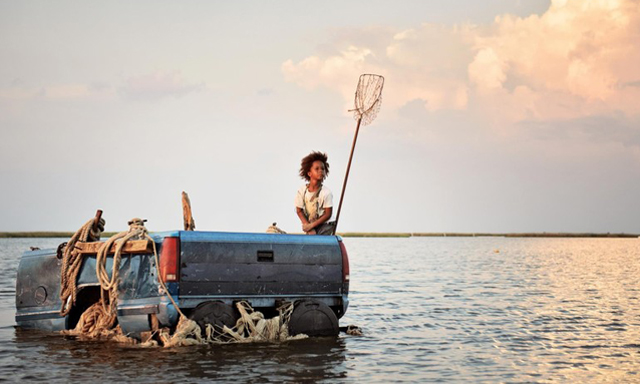 Film: Beasts of the Southern Wild
Film: Beasts of the Southern Wild
Country: USA
Year of Release: 2012
Director: Benh Zeitlin
Screenwriters: Lucy Alibar, Benh Zeitlin
Starring: Quvenzhane Wallis, Dwight Henry, Levy Easterly
Review: Peter Machen
♥♥♥♥½
Beasts of the Southern Wild is one of the most remarkable films I’ve seen in many years. One of the big hits of this year’s Durban International Film Festival, the film tells the story of six-year old Hush Puppy (Quvenzhane Wallis) and the rag-tag community she lives with in ‘the Bathtub’, a Louisiana bayou sealed off from the mainland by a levee built to keep the water out.
In this marginalised and self-reliant community, things are very different from the rest of America and indeed the rest of that dying beast we call Western Civilisation. In the bathtub, there is no distinction between humans and animals – all things die and all things get eaten and nature provides everything that is needed, mostly in the form of edible crustaceans. Raised by her father and extended community in the ways of independence and autonomy, Hush Puppy is very aware that her world is different to the rest of America, where they “got fish stuck in plastic wrappers, babies stuck in carriages, chicken on a stick and all that kind of stuff”.
Fuelled by the stories told to her by adults and by her extraordinary intelligence and imagination, Hush Puppy occupies a self-constructed universe in which everything fits together “just right” and everything is dependent on everything else, no matter how small. Her mother has left, while her alcoholic father (Dwight Henry) abandons her to her own devices much of the time, despite his evident but largely inexpressible love for his stubborn and wilful daughter. From this alienated perspective, Hush Puppy, aware that the fragile web of life on earth is being torn asunder, imagines vast shelves of ice falling into the sea, and mythical horned beasts named Aurochs awaking from the ice. When a particularly fierce storm makes its way to the Bathtub and raises the level of the water, Hush Puppy and her father, along with the others who have stayed behind, begin to eke out their survival in the newly floating world.
Although, I’m pretty sure that it’s not the film’s intention, Beasts stands as a powerful rebuke to the excesses of contemporary cinema. Made with what is necessarily a large crew, this beautifully controlled film feels as fluid, freewheeling and full of life as its libertarian characters. Despite being located in a dreamy magical realism, it is more convincing that nearly everything I’ve watched in the past few years. The film is all the more remarkable for the fact that it is director Benh Zeitlen’s first film and also the debut performance from Quvenzhane Wallis, who gives a performance as real and elemental as the storm that threatens her very world.
The film also achieves the strange feat of being about many different things at the same time, and also about nothing at all other than the texture of life itself. At once dreamlike and deeply realistic, the film is apolitical and also extremely political. It is about climate change and Gaia theory but doesn’t mention either. It is firmly grounded in our current world, but also timeless, and would make just as much sense in a real-world that didn’t appear to be passing its sell-by date. And so, while it is very easy to take Beasts as a warning about our future, that is surely not its point – God knows we’ve had enough warnings by now.
Instead, it is a deeply poetic film that celebrates the rhythms and melodies of humanity and nature without a single false note or act of audience manipulation. And for a film that is ostensibly about the End of the World, it’s profoundly upbeat. While I’ll admit I did shed a few tears during its final moments, I did so not for any reason other than the film’s sheer unvarnished brilliance. Beautifully written, with superb performances, a perfectly resonant score and cinematography that is all the more impressive for never trying to impress, Beasts is the kind of film that never makes use of technical virtuosity for its own sake. Everything that is there is there to serve the story it tells.
What is perhaps most significant about the film though – and this is one the things that has got critics around the world so very excited about ‘Beasts’– is that it offers a vision that has never been seen before but one that is also easily accessibly for a mainstream audience. Contemporary left-field cinema regularly produces masterpieces, but due to the collapse of the mainstream into a single and singularly entertainment-minded channel, most of those films are too ‘difficult’ for viewers who are used to generic Hollywood products. Beasts is one of those rare films that is as easily watchable by fans of the Transformers franchise as it is by devotees of Werner Herzog. It is so engaging, lyrical and entertaining, that I can’t imagine anyone not liking it.
While I appear to have been extremely generous in my praise, the truth is that I haven’t even begun to do Beasts of the Southern Wild justice. I could write another few thousands words and I’d still be lacking. Watch this film. And then watch it again. Myself, I’m looking forward to watching it a third time when it opens this weekend, and I only expect it to get better. There are very films that I could say that about.

Agreed, remarkable!